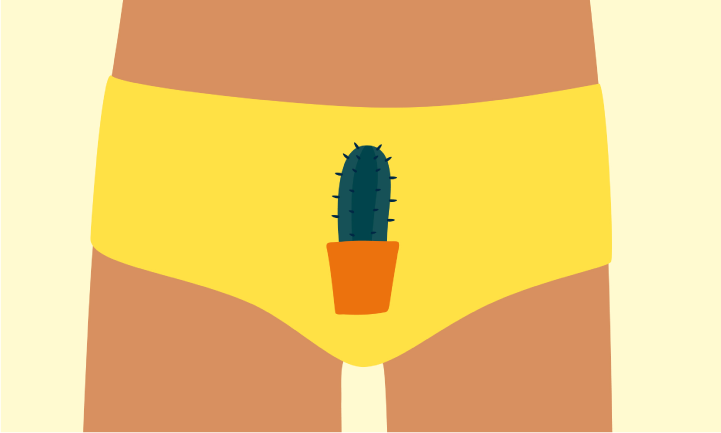Vaginal Dryness: What Is It and What Causes It?

Have you ever experienced symptoms of a dry vagina? Unfortunately, most of us will. According to Women's Health, around 17% of women aged 18-50 experience vaginal dryness before menopause, and more than 50% of post-menopausal women over 51 experience problems with it.
In this guide, we look into exactly what vaginal dryness is, what causes it, how to treat it, and how to prevent it.
In a rush? Read this quick summary:
- Vaginal dryness is very common and most of us will experience symptoms of a dry vagina at some point.
- Vaginal dryness is most commonly a symptom of menopause, due to a decrease in oestrogen as we age. However, there can be other causes.
- Symptoms of vaginal dryness can include burning or soreness, pain or friction during sex, bleeding after sex, recurring UTIs and needing to pee more than normal.
- Causes of vaginal dryness can include menopause, childbirth, taking antidepressants, having a hysterectomy, washing too often, and diabetes.
- There are many ways to treat vaginal dryness, and usually it can be treated at-home.
What is vaginal dryness?
Like many people, I grew up being warned not to use perfumed soap inside my vagina, because it's self-cleaning — and it turns out, it's true! Our cervix naturally produces lubrication, which moves slowly through the vagina and keeps it moist.
This thin layer of moisture shouldn't be confused with vaginal discharge. The natural lubricant keeps the vagina moist, while vaginal discharge cleans the vagina and removes dead cells, helping prevent infections. The natural lubrication, aka vaginal moisture, coats the walls of the vagina and keeps the lining of your vagina healthy, tight, and elastic. It also helps prevent friction during sexual intercourse.
However, as we age, our hormone production changes, and we experience a drop in oestrogen, which reduces the amount of moisture available, causing the walls of the vagina to get thinner. Although ageing is the most common cause, it can happen at any age from many other causes.
The decrease in vaginal moisture causes vaginal dryness, which can be painful and irritating, and have a huge impact on your life in different ways. Luckily, there are several treatments available to help relieve the symptoms that come with vaginal dryness.
What are the symptoms?
The main symptom of vaginal dryness is a feeling that your vagina is dry and sore. However, there are usually other symptoms. You should see your doctor if you:
- feel burning or sore in and around your vagina
- feel pain or friction during penetration
- are bleeding following intercourse
- keep getting urinary tract infections (UTIs)
- need to pee more than usual
Most people experiencing vaginal dryness will also have a reduced interest in having sex because of the discomfort that is felt during sexual intercourse.
What causes it?
As we age, we produce less estrogen which leads to the end of menstruation during a time known as perimenopause. Vaginal dryness is a common perimenopause and menopause symptom, however, there can be other causes. These can include:
- Childbirth and breastfeeding can cause vaginal dryness, but this is temporary and will gradually fade away as your hormone levels return to normal.
- Hormonal contraceptives and birth control can disturb the body's natural hormone levels, which can cause problems like vaginal dryness.
- Taking antidepressants can also be a common cause of vaginal dryness as they impact receptors and block certain involuntary bodily functions.
- If you have had a hysterectomy, you will likely experience vaginal dryness, as the cells that produce the natural lubrication are often.
- Chemotherapy affects the hormone production in the ovaries, which leads to vaginal dryness. However, this is temporary, and should go back to normal once your treatment ends.
- Washing too often or using soap in and around the vagina can disrupt the natural pH levels and cause the vagina to dry out.
- Diabetes has been known to cause damage to the small nerves and blood vessels, which can be a cause of vaginal dryness.
How can you treat vaginal dryness?
Luckily, there are many ways to treat vaginal dryness. If you're not sure why you have vaginal dryness, we recommend seeing your doctor. However, if you know the cause, there are a few treatments you can try out yourself as the first port of call.
How to treat vaginal dryness yourself:
- Use water-based lubricants before sexual intercourse — make sure you use a good amount of lubricant and put it in and around your vagina, on your partner's penis, on your partner's fingers, or on a sex toy if you are using one. This will help ensure everything is fully lubricated, and reduce the chance of friction causing or worsening any vaginal dryness.
- Purchase vaginal moisturisers — there are special gels and creams for vaginal dryness designed to be put inside the vagina to keep it moist. These products contain natural moisturisers that stick to the lining of your vagina, helping it repair.
- Use unperfumed soaps when washing around your vagina — as mentioned above, your vagina is self-cleaning, and harsh soaps or body wash products can irritate your vaginal wall and actually cause vaginal dryness. The best way to make sure your vagina is clean and healthy is simply to let it do its own thing!
- Try more foreplay — when having sex, it's a good idea to try to enjoy more foreplay before sexual intercourse, as this will help keep you aroused during sex, and your vagina will stay moist and lubricated, preventing any vaginal dryness.
See your doctor if:
- At-home treatments are not working, and you've had vaginal dryness for more than a couple of weeks.
- Vaginal dryness affects your daily life.
- You notice abnormal discharge or bleeding from your vagina.
- You notice bleeding after sex or in between periods.
In some cases, you won't be able to treat vaginal dryness yourself, and you'll need medical advice from a doctor. If vaginal dryness is a symptom of menopause, your doctor or healthcare provider might prescribe oestrogen therapy in a pill, cream, or ring. This releases the oestrogen lost due to menopause, helping relieve your symptoms.
Creams and rings release oestrogen directly to the tissues. If you are experiencing other uncomfortable menopausal symptoms, such as hot flushes, your doctor might prescribe a pill instead.
Our five top tips to prevent vaginal dryness:
Sometimes, vaginal dryness is a symptom of things such as menopause, meaning it can't be prevented. However, there are a number of other things that you can avoid doing in order to prevent causing vaginal dryness. Here's our five top tips to prevent dry vagina symptoms:
- Your vagina is self-cleaning, so avoid using bubble baths, scented soaps, lotions, and douches around or inside the vagina. These products can worsen dryness.
- Avoid condoms that contain the chemical nonoxynol-9, otherwise known as N-9. This can cause vaginal dryness.
- Take your time before having sexual intercourse, and integrate more foreplay to ensure that you are fully aroused before penetration.
- Use water-based lubricants before having sex. This can help reduce friction during sexual intercourse, which will worsen dryness.
- Be careful with what you choose to wear down there, and opt for soft, breathable underwear to ensure you are comfortable and your vagina is not restricted.
Breathable period pants keep you leak-free and comfortable
Our period pants look like regular underwear, but absorb your flow, keeping you covered day and night. They are moisture-wicking and breathable and come in different styles and absorbencies.
From High Waisted period underwear to super comfy Sleep Shorts to ultra-thin Seamless period underwear, you can find a pair of period pants that will suit you and your lifestyle.
- Tags: Myths & Facts Periods



